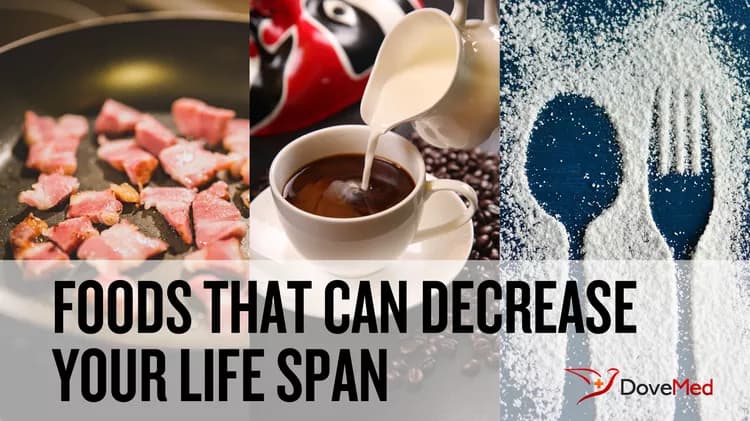Oftentimes we hear about the foods we should incorporate into our diet to better our health and increase our life span. The mortality risk-reducing properties of fish and whole grains have long been documented due to their rich nutrient content. But less regularly do we hear about the foods that can shorten our lifespan and carry life-threatening risks to our health.
Processed Meats:
It should not come as a surprise that bacon, despite its incredible flavor and adaptability to every meal of the day, could have a substantial impact on your health. Recently, bacon and other processed meats have gained a rebirth in the food industry, as they are now added to items beyond the breakfast menu such as sandwiches and appetizers. But you should take the time to consider that it might not be worth the health risk.
American Institute for Cancer Research defines processed meat as “meat preserved by smoking, curing or salting, or addition of chemical preservatives.” These processed meats include bacon, ham, sausage, deli meats, and hot dogs. The Harvard School of Public Health completed a study in 2012 concluding that even small portions of processed meat consumed on a regular basis has a significant correlation with an increase in colorectal cancer, cancer mortality, and cardiovascular disease. All of these conditions, if developed, can threaten your lifespan dramatically. Due to these severe risks, it is recommended that these foods be avoided.
Coffee:
Millions of people in the U.S., and significantly more worldwide, drink coffee as part of their daily routine. However, evidence from recent studies may cause you to want to limit your coffee intake, if you are younger than 55 years. A study released from the Mayo Clinic in 2013 asked 43,000 adults about their coffee consumption each day. The health of the participants was followed for an average of 17 years. A positive correlation was observed in men between all-cause mortality and coffee consumption and in men and women younger than 55 years old. It was found that younger subjects who drank more than 4 cups per day were more likely to die sooner than those who chose alternative drinks.
Sugar:
It is common knowledge that sugar has negative effects on your health. It is been long associated with weight gain and its impact on the onset of type II diabetes. Added sugar is hidden in sodas, tea and juice drinks, canned fruits, baked goods, muffins, cereal bars, breakfast cereals, jellies, and surprisingly in some pasta sauce and barbecue sauce.
In a joint study between the Centers for Disease Control and Prevention and the Harvard School of Public Health in 2014, researchers published their findings of the correlation between added sugar intake and cardiovascular disease mortality among U.S. adults over a decade. The participants who consumed more than a quarter of their calories from added sugar were about 3 times more likely to die from cardiovascular disease than those who got less than a quarter of their calories from added sugar. The findings of this study suggest that you should not derive more than 10% of your total calorie intake from sugar.
These compiled findings are not meant to scare you, but give you an insight as to how detrimental excess amounts of these foods can be on your health and the impact they can have on your longevity. In this case, the saying ‘everything in moderation’ applies here. Examine food labels to determine excess sugar content. Avoid cooking with processed meats and indulge only on special occasions. Limit coffee intake per day to a reasonable amount such as a cup or two. Little measures can be taken to reduce your risk of these types of mortalities and make your body more resilient and healthy for years to come.
References:
FAQ: Processed Meat and Cancer [Internet]. 2014 Aug 7. [cited 2014 Oct 30]. Available from: http://www.aicr.org/enews/2014/08-august/faq-processed-meat-and.html
Pan A, Sun Q, Bernstein AM, et al. Red Meat Consumption and Mortality: Results From 2 Prospective Cohort Studies. Arch Intern Med. 2012;172(7):555-563.
5 Foods That May Lengthen-or Shorten-Your Lifespan [Internet]. Yale Medical Group; 2013 Oct [updated 2013 Sep 9; cited 2015 Jan 27]. Available from: http://yalemedicalgroup.org/info/health.aspx?ContentTypeId=88&ContentId=p10712
Liu J, Sui X, Lavie CJ, Hebert JR, Earnest CP, Zhang J, Blair SN. Association of Coffee Consumption With All-Cause and Cardiovascular Disease Mortality. Mayo Clinic Proceedings. 2013;88(10):1066-1074.
Sugar intake linked to heart disease deaths [Internet]. PubMed Health; 2014 Feb 4 [cited 2015 Jan 27]. Available from: http://www.ncbi.nlm.nih.gov/pubmedhealth/behindtheheadlines/news/2014-02-04-sugar-intake-linked-to-heart-disease-deaths/
Yang Q, Zhang Z, Gregg EW, Flanders WD, Merritt R, Hu FB. Added sugar intake and cardiovascular diseases mortality among US adults. JAMA Intern Med. 2014;174(4):516-24.
Helpful Peer-Reviewed Medical Articles:
Mair, W., Piper, M. D., & Partridge, L. (2005). Calories do not explain extension of life span by dietary restriction in Drosophila. PLoS biology, 3(7), e223.
Fontana, L., Partridge, L., & Longo, V. D. (2010). Extending healthy life span—from yeast to humans. science, 328(5976), 321-326.
Bishop, N. A., & Guarente, L. (2007). Genetic links between diet and lifespan: shared mechanisms from yeast to humans. Nature reviews. Genetics, 8(11), 835.
Related Articles
Test Your Knowledge
Asked by users
Related Centers
Related Specialties
Related Physicians
Related Procedures
Related Resources
Join DoveHubs
and connect with fellow professionals


0 Comments
Please log in to post a comment.